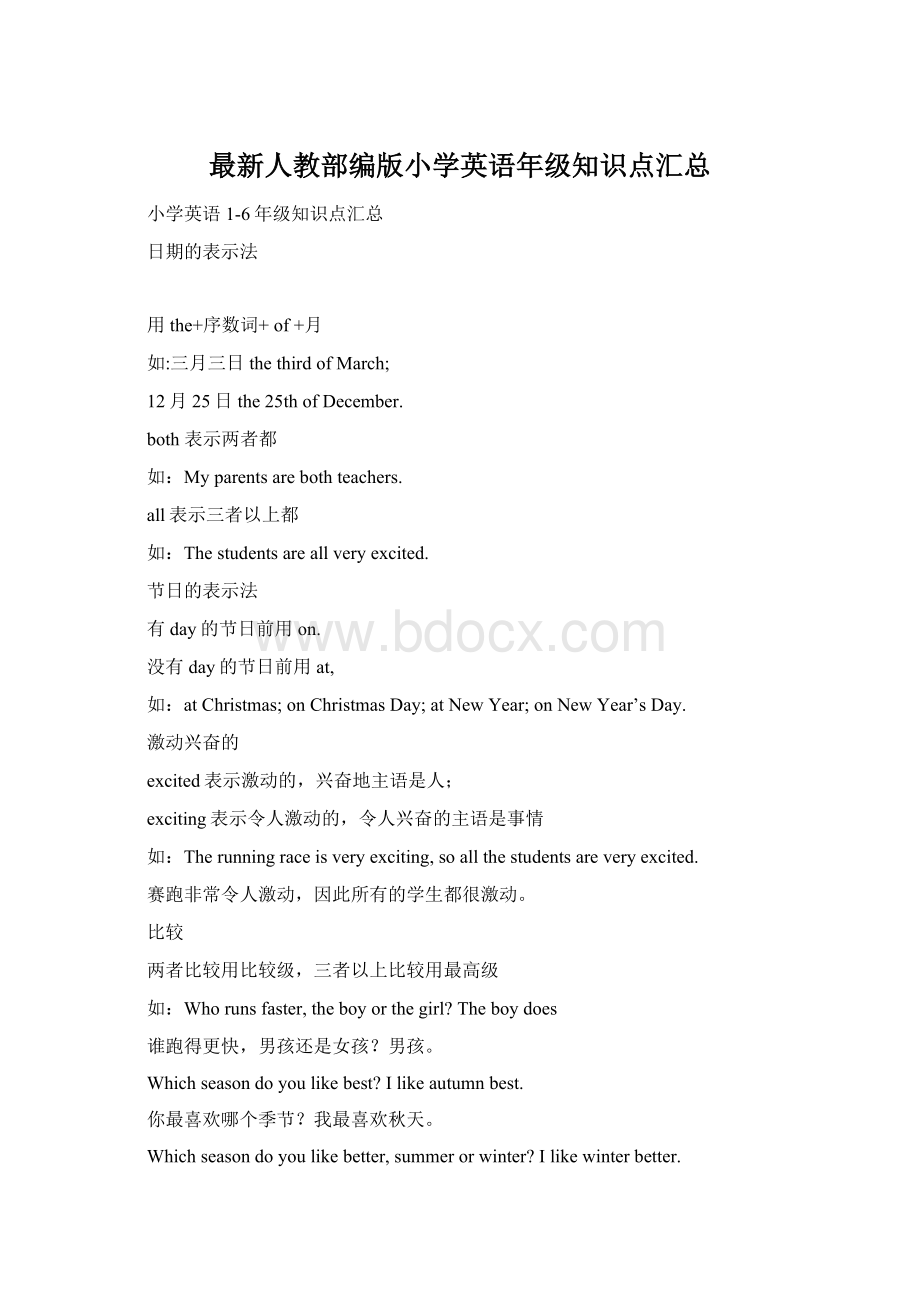最新人教部编版小学英语年级知识点汇总文档格式.docx
《最新人教部编版小学英语年级知识点汇总文档格式.docx》由会员分享,可在线阅读,更多相关《最新人教部编版小学英语年级知识点汇总文档格式.docx(16页珍藏版)》请在冰豆网上搜索。

让某人做某事
用letsb后加动词原形
Let’swatertheflowerstogether.
是该做…的时候了用It’stimefor+名词或It’stimeto+动原。
帮助某人做某事是helpsbwithsth
帮我学英语是helpmewithmyEnglish
树上
外来的东西在树上用inthetree
thebirdinthetree;
树上长的用onthetree
theapplesonthetree
运动和乐器
球类之前不加the;
乐器之前必须加the
playthepiano;
playfootball
现在进行时
表示正在发生的事情或进行的动作,常与now,listen,look等词连用,结构是主语+be动词(am,is,are)+动词ing.
Itisrainingnow.
外面正在下雨
Itissixo’clocknow.
现在6点了
Myparentsarereadingnewspapersinthesittingroom.
我父母正在客厅看报纸
Look!
Thechildrenarehavingarunningracenow.
看!
孩子们正在赛跑
问句将be动词移前,否定句在be动词后+not.
一般现在时
表示经常反复发生的事情或动作,常与often,usually,sometimes,always,everyday(weekyear…)onSundays等词连用。
结构是主语+动词原形;
当主语为第三人称单数即he,she,it,Tom,mymother,theboy等词时,动词后加s或es.
WehaveanEnglishlessoneveryday.
我们每天都要上英语课
Dotheboysrunfasterthanthegirls?
Yes,theydo.
男孩比女孩跑的快吗?
是的
问句借助于do,does否定句借助于don’t,doesn’t,后面动词一定要还原。
一般过去时
表示发生在过去的事情或存在的状态,常与justnow;
amomentago;
…ago;
yesterday;
last(week;
month;
year;
Monday;
weekend);
thismorning等词连用。
结构是主语+be动词的过去式(was;
were)或主语+动词的过去式。
注意:
be动词与动词过去式不可同时使用。
Myearphoneswereonthegroundjustnow.
我的耳机刚刚还在呢。
Wherewereyoulastweek?
Iwasatacamp.
你上个星期去哪了?
我去野营了
Whatdidyoudoyesterday?
Ivisitedafarm
你昨天去干嘛了?
我去参观农场了。
问句有be动词将be动词移前,没有be动词借助于did,后面动词还原;
否定句有be动词在后面加not,没有借助于didn'
t后面动词还原。
一般将来时
表示将要打算发生的事情或动作,常与tomorrow,nextweek(year;
Tuesday…),thisweek(weekend;
evening;
afternoon;
…)today等词连用。
结构是主语+be(am,is,are)goingto+动原或主语+will+动原。
Whatareyougoingtodotomorrow?
Iamgoingtohaveapicnic.
你明天要去干嘛?
我要去野餐。
Thechildrearegoingtohaveasportsmeetingnextweek.
孩子们下个星期将参加运动会。
Tomwill/isgoingtoseeaplaywithhisfatherthisevening.
Tom今晚将和父母去看演出。
问句将be动词或will移前;
否定句在be动词或will后加not.
情态动词
can;
can’t;
should;
shouldn’t;
must;
may后一定加动词原形。
Thegirlcan’tswim,butshecanskate.
女孩不会游泳,但是会滑冰
Don’ttalkinclass,youshouldlistentotheteachercarefully.
不要再课上说话,你应该认真听老师讲。
祈使句
肯定祈使句以动词原形开头;
否定祈使句以don’t加动词原形开头。
Opentheboxforme,please.
请为我打开盒子。
LiuTao!
Pleasegetupearliertomorrow.
刘涛,明天请早点起床!
Don’twalkonthegrass!
不要在草地上走!
Helen!
Don’tclimbthetree,please.
海伦!
不要爬树。
go的用法
去干嘛用go+动词ing
goswimming;
gofishing;
goskating;
gocamping;
gorunning;
goskiing;
gorowing…
than前用比较级;
as…as之间用原级。
Mymotheristwoyearsyoungerthanmyfather.
我妈比我爸年轻两岁。
LiuTaojumpsasfarasBen.
刘涛跳得和本一样远。
喜欢做某事
用like+动词ing或like+to+动原。
SuYanglikesgrowingflowers.
苏阳喜欢种花。
ThechildrenliketoplaywithlanternsatSpringFestival.
孩子们喜欢在春节去玩花灯。
想要做某事
用wouldlike+to+动原或want+to+动原。
例:
I’dliketovisittheHistoryMuseum.=IwanttovisittheHistoryMuseum
some
用于肯定句中,在否定句和问句中改为any,但当表示委婉语气时仍用
CanIhavesomewritingpaper?
Wouldyoulikesomeorangejuice?
代词
人称代词主格做主语用一般放在句首或动词前,主格分别是Iyouhesheitweyouthey。
宾格做宾语用,一般放在动词或介词后
Openthemforme.
Letus…,joinme等。
宾格分别是meyouhimheritusyouthem。
形容词性物主代词放在名词前,不能单独使用,分别是myyourhisheritsouryourtheir
名词性物主代词相当于形物加名词,它只能单独使用后面不好加名词,分别是mineyourshishersitsoursyourstheirs。
介词
介词后要么不加动词,加动词只能加动词ing形式
begoodatrunning;
dowellinjumping;
时间介词
季节前,月份前用介词in
insummer;
inMarch
具体的哪一天如星期几,几月几日用介词on
onSaturday;
onthesecondofApril;
onWednesdaymorning
在几点钟前用介词at
ataquartertofour;
只在上下午晚上用in
inthemorning/afternoon/evening;
但在夜间用atnight。
另:
季节,月份和星期前不好加the.
名词复数构成的方法
有规则的有:
(1)直接在名词后加s
如orange—oranges;
photo—photos;
(2)以x,s,sh,ch结尾的加es
box—boxes;
glass—glasses;
waitress—waitresses;
watch—watches;
peach--peaches
(3)以辅音字母加y结尾的改y为i加es
study—studies;
library—libraries;
hobby—hobbies;
family—families;
(4)以f,fe结尾的改f,fe为v+es如:
knife—knives;
thief—thieves(注:
以o结尾的我们学过的只有mango加es,mango—mangoes其余加s,)
不规则的有:
man—men;
woman—women;
people—people;
child—children
动词第三人称单数的构成
(1)直接在动词后加s
run—runs;
dance—dances
(2)以s,sh,ch,o结尾的加es
do—does;
go—goes;
wash—washes;
catch—catches
(3)以辅音字母加y结尾的改y为i加es
study—studies;
carry—carries;
现在分词的构成
(1)直接在动词后加ing
sing—singing;
ski—skiing;
(2)双写词尾加ing
swim—swimming;
jog—jogging;
run—running;
(3)以不发音的e结尾的去e加ing
ride—riding;
dance—dancing;
make—making;
规则动词过去式的构成
(1)直接在动词后加ed
clean—cleaned;
milk—milked;
play—played;
(2)以e结尾的直接加d
dance—danced;
taste—tasted;
(3)以辅音字母加y结尾的改y为i加ed
study—studied;
carry—carried;
(4)双写词尾加ed
stop—stopped;
jog—jogged;
am,is—was;
are—were;
do,does—did;
have,has—had;
go—went;
meet—met;
sit—sat;
see—saw;
get—got;
tell—told;
run—ran;
come—came;
steal—stole;
read—read;
形容词副词比较级的构成
规则的:
(1)直接在形容词或副词后加er
如;
small—smaller;
low—lower;
(2)以e结尾的加r
late—larer;
(3)双写词尾加er
big—bigger;
thin—thinner;
fat—fatter;
(4)以辅音字母加y结尾的改y为i加er
heavy—heavier;
early—earlier;
good,well—better(最高级为best);
many,much---more(最高级为most);
far---farther;
rain与snow的用法
(1)作为名词意思是雨水和雪是不可数名词
Thereisalotofrainthereinspring.那儿的春天有很多雨水。
(2)作为动词意思是下雨和下雪,有四种形式分别是:
动词原形rain,snow;
第三人称单数rains,snows;
现在分词raining;
snowing
过去式rained;
snowed;
①Look!
Itisrainingnow.瞧!
天正在下雨。
②ItoftenrainsinNantonginsummer.南通夏天经常下雨。
③Itrainedyesterday.昨天下了雨。
④Itisgoingtoraintomorrow.明天要下雨。
(3)形容词为rainy和snowy意思是有雨的和有雪的
Itisoftenrainyhereinspring.这儿的春天经常是有雨的。
Ifitisrainytomorrow,I’llstayathome.如果明天是有雨的,我将呆在家里。
比较级
注意只有同类事物才可进行比较。
Myeyesarebiggerthanhers.Yourschoolbagisheavierthanmine.MycomputerisnicerthanNancy’s.Mybrotherisstrongerthanme.
have,has
表示某人有(has用于第三人称单数);
Thereis/are;
Therewas/were表示某地存在有
注意Therebe句型的就近原则
单数或不可数用thereis/was;
复数用thereare/were.
本身就是复数的词
眼镜glasses;
耳机earphones;
鞋shoes;
裤子trousers等词本身是复数。
Myglasseswereonthechairjustnow.
但如果表示这双,这副,一双的时候用单数
Thereisapairofchopsticksontheplate.Thispairofearphonesisforyou.
五个元音字母分别是Aa,Ee,Ii,Oo,Uu;
一个的用法
a用于辅音前不是辅音字母前;
an用于元音前不是元音字母前。
Thereisan’s’,a‘t’,a‘u’,a‘d’,an‘e’,an‘n’,anda‘t’intheword‘student’.
时间表示法
有两种:
(1)直接读时钟和分钟。
如6:
10读成sixten;
7:
30读成seventhirty;
8:
45读成eightforty-five;
(2)用to与past表示。
在半小时包括半小时以内用几分past几点
6:
10读成tenpastsix;
30读成halfpastseven;
过了半小时用下一个钟点差几分
如7:
45读成aquartertoeight;
9:
50读成tentoten;
基数词变序数词的方法
基变序有规律,结尾加上th;
一二三特殊例,结尾字母t、d(即first,second,third);
八去t,九去e,ve要用f替(即eigh—eighth;
nine—ninth;
five--fifth;
twelve—twelfth);
ty改y为ie后加th别忘记(即整十数如twenty—twentieth;
forty—fortieth);
几十几十位为基个位为序(如第二十一为twenty-first)。
另外强调序数词前一定要加the。
1、写出完全形式:
1.who'
s=whois
2.she'
s=
she
is
3.he'
he
is
4.what'
whatis
5.where’s=whereis
6.we'
re=
weare
7.you'
re
=youare
8.that'
s
=that
9.I'
m=
Iam
10.isn'
t
=isnot
11.aren'
=arenot
12.they'
theyare
13.don'
=do
not
14.let'
=let
us
15.can’t=
can
16.it'
it
17.I’ve=
I
have
18.I’d=
would
19.hasn’t=
has
not
2、写出下列单词的复数形式:
1.bus
——
buses
2.box
——
boxes
3.glass
glasses
4.class
classes
5.watch
watches
6.mango
mangoes
7.firefly
fireflies
8.sheep
sheep
9.people——
people
10.man
men
11.woman——
women
12.apple
apples
13.family
——families
14.library——
libraries
15.baby
babies
16.boy
boys
17.toy
toys
18.child
children
19.foot
feet
20.strawberry
strawberries
21.horse
horse
22.policeman
policemen
23.dress
dresses
24.fish
fish
25.tooth
teeth
26.country——
countries
27.foot——
feet
28.dragonfly——
dragonflies
29.me
us
30.building
buildings
31.cloth
clothes
32.this
these
33.that
those
34.circle
circles
35.story
stories
3、反义词或对应词:
1.same——
different
2.new
——old
3.old
——young
4.short
——long
5.big
——small
6.tall
——short
7.yes
no
8.open
——close
9.hot——
cold
10.here——
there
11.sit
——stand
12.up
——down
13.thin
——fat
14.father
——mother
15.right
wrong
16.black
——white
17.this——
that
18.these——
those
19.boy
——girl
20.grandfather
——grandmother
21.man
——woman
22.husband——
wife
23.aunt——
uncle
24.brother——
sister
25.he——
she
26.
left——
right
27.go
——come
28.
nurse
——doctor
29.good
——bad
30.minus——
plus
31.
his
——her
32.busy——
free
33.hand
——foot
34.legs——
arms
4、近义词:
1.desk——table
2.like——love
3.often——usually
4.start——begin
5.great——good
5、同音词:
1.